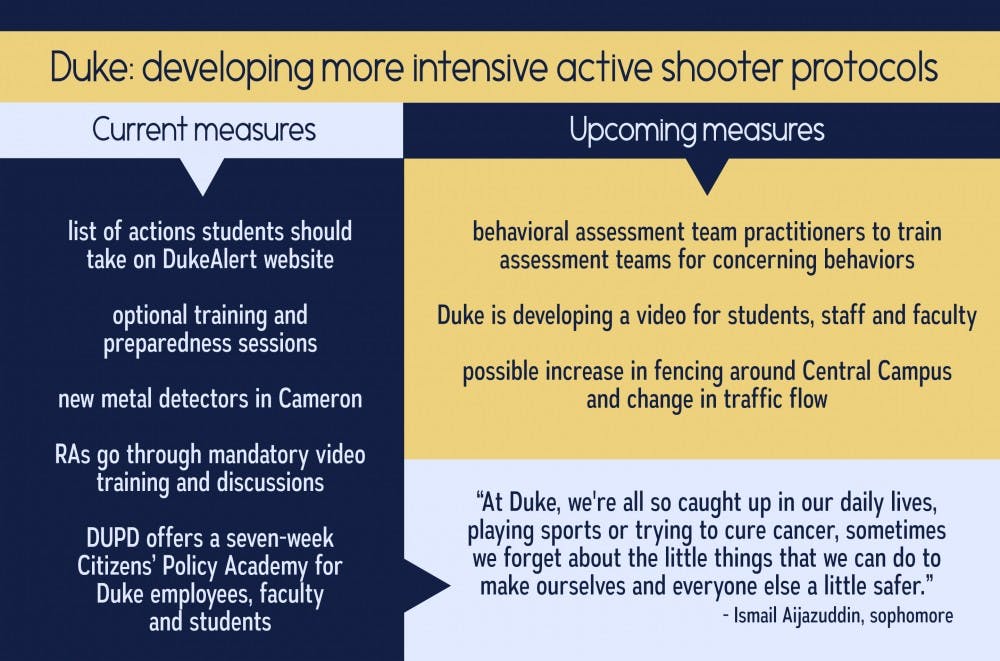Duke is in the process of spreading awareness about its active shooter protocols.
According to an article in TIME Magazine Oct. 1, there were 23 shootings on college campuses last year—a figure that sparked national debate about how universities should better provide for their students’ protection. Duke students never have to participate in active shooter drills, said Daryl Mount, a crime prevention specialist at the Duke University Police Department. On the DukeAlert website, however, there is a list of actions students should take in such an event—including evacuating, hiding out and taking action as a last resort. Mount said that optional training and preparedness sessions are offered for students, but noted that participation rates are low.
“The University, as a whole, is trying to push the steps that need to be taken and the mindset necessary to survive an active shooter scenario,” Mount said. “It’s just a slow process to get the message out because [the administration] wants to make sure it’s spreading the right message.”
DUPD offers a seven-week Citizens' Policy Academy for Duke employees, faculty and students. Its seventh iteration, which begins Monday and will run until March 24, will address subjects including firearms safety, active shooter protocols and crime scene investigation.
Mount explained that DUPD officers go through annual training for the possibility of an active shooter in all possible settings, including academic, residential and social environments.
Joe Gonzalez, dean for residential life, said that Housing, Dining and Residence Life is currently developing more emergency protocols for such dire situations. The new plans will tentatively be finalized by August and have been in the development process for six months, Gonzalez said.
“If that terrible situation was to occur on our campus, we really want people to feel empowered to the steps they need to take to keep themselves safe,” Gonzalez said.
DUPD Chief of Police John Dailey wrote in an email that Duke has brought in “leading behavioral assessment team practitioners” to train behavioral assessment teams, which have representatives from various University departments, to assess concerning behaviors.
All resident assistants participate in mandatory video training and discussions before orientation week, which is based on the plan on the DukeAlert website. The plan advises students, patients and visitors to follow the lead of an employee in the event of an active shooter scenario, and recommends that they evacuate, hide out and take action if necessary.
Ismail Aijazuddin, a sophomore and RA in Bell Tower residence hall, said that he feels more prepared to deal with such an active shooter situation after attending this mandatory summer training.
“The sad reality is that there are shootings on college campuses,” Aijazuddin said. “In the event that something arises, I hope that the people who attended [these trainings] will be a little quicker to act than others.”
Duke is developing a video for students, staff and faculty slated to be released in the next two weeks, Dailey wrote.
Gonzalez said that HDRL is considering increasing the fence around Central Campus and changing the traffic flow.
Although North Carolina law allows guns on public university campuses under limited conditions, Duke continues to ban all firearms on campus, according to Duke’s Weapons/Firearms/Explosives policy.
The density of people in Cameron Indoor Stadium also can be problematic for quickly and efficiently responding to emergency situations. Senior Will Bobrinskoy, co-head line monitor, wrote in an email that every person who enters Cameron must go through a metal detector and that bags are not allowed in Cameron, which makes it substantially harder to get a gun in the arena.
“There are evacuation policies in place to make sure all attendees can exit the building as well as lockdown policies if a situation is occurring elsewhere on campus,” Bobrinskoy wrote. “We think the staff does an awesome job of making sure everyone in Cameron is safe while not negatively affecting the spectators’ experiences.”
Mount said that improving DUPD’s policies is a continual work in progress.
“Here at DUPD, we understand that college can be scary experience,” Mount said. “We want students at Duke to feel secure on this campus, at any time of the day or night, and we’re working toward that.”
Aijazuddin said it is important for Duke students to think of their safety and of others.
“At Duke, we’re all so caught up in our daily lives, playing sports or trying to cure cancer, sometimes we forget about the little things that we can do to make ourselves and everyone else a little safer,” Aijazuddin said.
Get The Chronicle straight to your inbox
Signup for our weekly newsletter. Cancel at any time.

